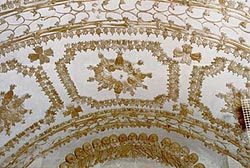 |
| The skeleton here is enclosed within an aureole, the symbol of life coming to birth. The right hand holds a scythe - the symbol of death. The left hand holds scales for judging the soul. |
The Santa Maria Della Concezione dei Cappuccini (Our Lady of the Conception of the Capuchins) is a Roman church commissioned by Pope Urban VIII in 1626. His brother, Cardinal Antonio Barberini, was a member of the Capuchin order. Capuchins are named for the hood (capuche) that is attached to their religious habit, and separated from the Franciscans in 1525 in order to get back to the roots of the Order. When this church was built Cardinal Barberini ordered the remains of thousands of Capuchin friars who had died to be exhumed and their bones brought to the new church, so that all might be in one place.
 |
| Image courtesy of flickr. |
Here the bones were arranged along the walls, and the friars continued to bury their dead here. The bodies of poor Romans were also buried here. The Capuchins would gather here each evening to pray and reflect. A plaque in one of the chapels reads (in three languages): "What you are now, we once were; what we are now, you shall be."
 |
| The crypt of the leg bones and thigh bones. In the niches are skeletons dressed in the Capuchin habit. On the wall to the left is the Franciscan coat-of-arms. |
 |
| The crypt of the pelvies. On either side are friars reclining. The rear wall has three friars leaning forward. Along with pelvises, vertebrae are used. |
 |
| The crypt of the skulls. Here, too, are friars reclining. |
The church was designed by Antonio Casoni, and was built between 1626 and 1631. There is a small nave, and several chapels to the side. One of the chapels contains the body of St. Felix of Cantalice. Noted for his piety, he composed simple canticles and taught groups of children to sing them to teach them catechism. He was beatified in 1625 by Pope Urban VIII, and canonized in 1712 by Pope Clement XI.
 |
| San Felice da Cantalice by Peter Paul Reubens, 17th century. Image courtesy of Santi Beati |
It is also the burial place of Crispin of Viterbo, known when he was young as "el Santarello" (the little saint), who was a follower of St. Felix. St. Crispin was beatified by Pope Pius VII in 1806, and was the first saint canonized by Pope John Paul II in 1982.
 |
| St. Crispin of Viterbo. Image courtesy of www.capuchins.org. |
The chapels contain many religious works of arts by well-known Italian artists and sculptors. But the church is most famous as an ossuary, where the bones of over 4,000 Capuchin friars, collected between 1528 and 1870, are displayed in what as known as the Capuchin Crypt. The practice was eventually banned by hygiene laws.
 |
| These bones form a frame for a picture of Jesus commanding Lazarus to come out of the tomb alive. To the Capuchins this illustrates the Christian belief in the resurrection. |
The bones are displayed as decorations of the Baroque and Rococo styles. As a tourist attraction, the crypt once rivaled the Roman Catacombs. The underground crypt is divided into five chapels but are only lit by natural light coming through cracks in the ceiling, and small fluorescent lights. Some of the skeletons are intact and draped with habits, but mostly bones are used for the elaborate decorative designs.
The Marquis de Sade visited the crypt and wrote, "I have never seen anything more striking." Mark Twain was a visitor in 1867, and wrote five pages about it in his book Innocents Abroad. According to the official website, the message here is clear: death closes the gates of time, and opens those of eternity.
***************
Unless otherwise noted, all images from the official website.
******************************

No comments:
Post a Comment
NOTE: COMMENTS WITH LINKS WILL NOT BE POSTED!